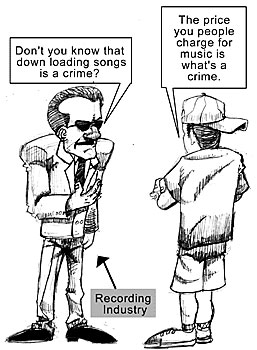
Illustration By Arnie Bermudez
|
|
By Brett Berry
Arizona Daily Wildcat
Tuesday, March 30, 2004
Print this
Last week, the Recording Industry Association of America announced a new round of subpoenas in its fight against music piracy, targeting those people who use peer-to-peer networks to share music files on their computers.
What makes these new subpoenas so interesting at the UA is that the RIAA has now demanded that the university hand over the names of the students who downloaded large numbers of songs using the university's network.
For those targeted by the suits, the RIAA claims that each song downloaded equates to damages amounting to $150,000 apiece ÷ a ridiculous figure. However, most of the previous suits have been settled for an average of $3,000 ÷ a much smaller figure.
Why does the RIAA claim such high damages and then accept an immensely smaller cash settlement? This is just the RIAA's new policy of using scare tactics to try and curb illegal downloading.
A few years ago at the Grammy Awards, the RIAA sent a representative to speak to the audience about how illegal song downloading was killing the music industry. It tried to guilt us into stopping our downloading, saying we were stealing from the pockets of our favorite artists. That didn't really work, so now it's trying to scare us with lawsuits.
It was around that time that bands like Metallica spoke out against downloading and filed lawsuits against Napster and similar companies. Of course, at the same time, there were artists who did not fear downloading.
For example, Weezer fought with its record company for months for the right to offer free downloads of early versions of its songs that would possibly be released later on albums.
But CD sales were declining, and that meant that the artists were going to go broke, right? Not really.
Recall that in the 1980s, the new innovation of the cassette tape allowed people to copy a friend's tape or record songs off of the radio.
People claimed that cassette bootlegging by such means was going to kill the music industry back then. But as U2's Bono said in an interview a few years ago, the bootlegging in the 1980s wasn't what was killing music, "crap music was killing music."
Even so, the musicians and the music industry obviously made it through that time all right.
Of course, as we all know, Napster was shut down, but it spawned plenty of imitators, including the popular Kazaa program (which has been immune to charges, being that the company is based overseas).
Here enter the new lawsuits. Because it cannot sue the overseas companies, the RIAA has come out and tried to attack the downloaders with these new lawsuits.
Now I don't like the lawsuits, but I'll be honest: Downloading is in fact illegal and should be dealt with.
However, lawsuits against individuals aren't necessarily the best way to deal with the problem.
If we are indeed being honest, then I can tell you that no artist will likely see a cent from the settlements that the record companies will receive from these suits. How can I say this, you ask? The record companies have already proved their greed to the world.
As I write this, I have in my possession a check from a class-action lawsuit that pays me $13.86 from the pockets of the record companies of the RIAA.
Though no one likes to mention it, the record companies themselves were brought to court last year over their own illegal activities. Anyone who purchased music between January 1995 and December 2000 was eligible to sign on to this lawsuit.
The suit alleged that the major record companies essentially colluded to raise prices by setting minimum advertising price policies across the board. Of course, this is in violation of both state and federal antitrust laws.
So, just as in the new lawsuits, the suit was put to rest by a cash settlement.
However, as opposed to the $3,000 each convicted downloader is paying, the record companies were forced to pay over $67 million to those who signed up to join in the settlement to make up for their greedy, cheating ways.
But I say let's be mature and put all of this greed and nastiness behind us.
I have a proposal for the RIAA to end all of this litigation: We music lovers will send back all of our settlement checks resulting from your illegal activities, and, in turn, you can discontinue your lawsuits against us for our illegal activities. Let's start anew and wipe the slate clean of all this dishonesty and bitterness.
Then you can target the companies that provide the free music, not those who enjoy it.
Brett Berry is a regional development sophomore who has downloaded some songs but still purchases plenty of music. He can be reached at letters@wildcat.arizona.edu.

